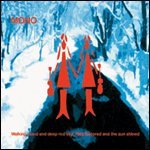
Mono Walking Cloud And Deep Red Sky, Flag Fluttered and the Sun Shined
(Rykodisc / Vital)
Japanese four-piece Mono have been described as the Eastern Mogwai or as the soundtrack to the end of the world. Both descriptions, while obviously simplistic, give you a rough idea of the directions that Messrs "Taka" Goto, Tamaki, Takada and Yoda move in. They create moving and stirring epic instrumental rock, building through slow, sonic progression towards tempestuous and emotionally raw crescendos.
Despite having been around for several years now (this is their third album), Mono have recorded an album that's naïve and youthful, perhaps aided by the ever visceral production of one Mr Steve Albini. The album is also a concept album, based around a story of a young girl who developed leukaemia in 1955 as an after-effect of the Hiroshima bombings. Her closest friend, visiting her in hospital, told her a story of the rewards that the gods bestow on anyone who makes 1,000 origami paper cranes. Wishing for a cure in the face of hope and medical science, the young girl started making paper cranes.
Generally Mono follow a route familiar to those who've heard the work of My Bloody Valentine or Giardini di Miró - quiet, speculative opening, often haunted by subtle strings, then rising to swirling rock climaxes. It's exemplified by "halcyon", where a cello laments as guitar noise builds slowly and progressively in the background, awaiting the inevitable thunder. Like chicken soup, this is a recipe almost intractably guaranteeing satisfaction. Like chicken soup, though, it is unlikely to win any awards. While there are moments of beauty here - the solitary violin on mere your pathetic light - I am not convinced that there aren't already enough bands out there following exactly the same model for it to be stimulating again. Múm have already proved that this sort of post-rock can be moved on with their glacial laments, a lesson that others need to heed.
Competent, compelling at times, but ultimately unsatisfying, this is an album that perhaps needed to have been released three years ago, before Godspeed You! or Silver Mount Zion. It is not so much anachronistic, as a little bit late.
15 May, 2004 - 23:00 — Ben Bollig